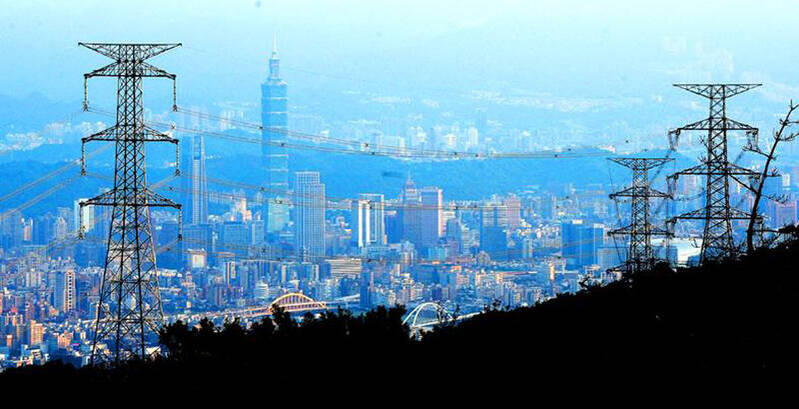State-owned oil refiner CPC Corp, Taiwan (CPC, 台灣中油) plans to boost its procurement of US energy products — including liquefied natural gas (LNG) and crude oil — in response to US President Donald Trump’s 32 percent tariff on Taiwanese exports, sources said yesterday.
President William Lai (賴清德) has said the government intends to expand purchases of US goods, including agricultural, industrial, and energy products, as part of its strategy to narrow the trade balance.
The Ministry of Economic Affairs said it aims for US-sourced LNG to account for 30 percent of Taiwan’s total LNG imports.

Photo: Lin Cheng-kun, Taipei Times
Last year, US LNG made up 10 percent of CPC’s imports, with the company sourcing from 14 different countries, the ministry said.
CPC sources said the target could be met by ramping up existing LNG imports from the US or seeking new supply channels, such as LNG from Alaska.
The company said it has inked a term sheet with select US firms certifying its intent to import LNG from Alaska, although the project could take five to seven years to come online.
The company said that major US energy firms maintain diversified global investments and that it has an understanding with its partners to adjust delivery volumes based on demand and evolving circumstances.
It also said it confirmed it would significantly increase LNG imports from the US over the next four years. It also plans to raise its purchases of US crude oil to help ensure a stable energy supply for the country.
The company said it primarily imports sweet crude oil, or crude with a lower sulfur content, from the US and African countries, adding that sweet crude, while more expensive, was more environmentally friendly.
It is also importing sour crude, or crude with higher sulfur content, from the Middle East, it added.
While the company had been considering scaling back US sweet crude imports due to declining domestic demand for gasoline and diesel, it is now reassessing that decision in light of the government’s push for net-zero emissions and broader energy diversification policies.
US-sourced crude has already increased from 44 percent to 60 percent of CPC’s total imports over the past three years. The rise was partly due to a fire at the company’s Dalin refinery’s heavy oil desulfurization unit on Oct. 27, 2022.
The Dalin facility has since been repaired and is expected to resume operations shortly, CPC said.

Rainfall is expected to become more widespread and persistent across central and southern Taiwan over the next few days, with the effects of the weather patterns becoming most prominent between last night and tomorrow, the Central Weather Administration (CWA) said yesterday. Independent meteorologist Daniel Wu (吳德榮) said that based on the latest forecast models of the combination of a low-pressure system and southwesterly winds, rainfall and flooding are expected to continue in central and southern Taiwan from today to Sunday. The CWA also warned of flash floods, thunder and lightning, and strong gusts in these areas, as well as landslides and fallen

WAITING GAME: The US has so far only offered a ‘best rate tariff,’ which officials assume is about 15 percent, the same as Japan, a person familiar with the matter said Taiwan and the US have completed “technical consultations” regarding tariffs and a finalized rate is expected to be released soon, Executive Yuan spokeswoman Michelle Lee (李慧芝) told a news conference yesterday, as a 90-day pause on US President Donald Trump’s “reciprocal” tariffs is set to expire today. The two countries have reached a “certain degree of consensus” on issues such as tariffs, nontariff trade barriers, trade facilitation, supply chain resilience and economic security, Lee said. They also discussed opportunities for cooperation, investment and procurement, she said. A joint statement is still being negotiated and would be released once the US government has made

SOUTH CHINA SEA? The Philippine president spoke of adding more classrooms and power plants, while skipping tensions with China over disputed areas Philippine President Ferdinand Marcos Jr yesterday blasted “useless and crumbling” flood control projects in a state of the nation address that focused on domestic issues after a months-long feud with his vice president. Addressing a joint session of congress after days of rain that left at least 31 dead, Marcos repeated his recent warning that the nation faced a climate change-driven “new normal,” while pledging to investigate publicly funded projects that had failed. “Let’s not pretend, the people know that these projects can breed corruption. Kickbacks ... for the boys,” he said, citing houses that were “swept away” by the floods. “Someone has

‘CRUDE’: The potential countermeasure is in response to South Africa renaming Taiwan’s representative offices and the insistence that it move out of Pretoria Taiwan is considering banning exports of semiconductors to South Africa after the latter unilaterally downgraded and changed the names of Taiwan’s two representative offices, the Ministry of Foreign Affairs (MOFA) said yesterday. On Monday last week, the South African Department of International Relations and Cooperation unilaterally released a statement saying that, as of April 1, the Taipei Liaison Offices in Pretoria and Cape Town had been renamed the “Taipei Commercial Office in Johannesburg” and the “Taipei Commercial Office in Cape Town.” Citing UN General Assembly Resolution 2758, it said that South Africa “recognizes the People’s Republic of China (PRC) as the sole